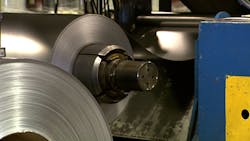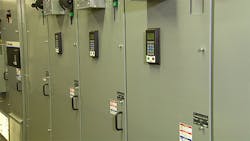The Centria Coating Services facility in Cambridge, Ohio, churns out approximately 600,000 pounds – or about 210,000 lineal feet – of coated steel and aluminum per day. That equals around 4 million pounds of metal running through the facility’s coating operations every week.
The painted metal that ships out is used in a broad variety of products, from walls and roofing on sports complexes, retail stores and office buildings, to signage, industrial cabinets, truck-trailer sheeting, furniture, tool boxes and electrical cabinets – even down to three-fourths-inch window louvers.
The steel and aluminum substrates – which can include galvanized, galvalume, stainless and bare aluminum – arrive at the Cambridge facility in the form of extremely large coils, weighing as much as 40,000 pounds. The range of paints and coatings that Centria can apply to these substrates on its paint line is infinite, with thousands of different paint colors, such as high-gloss, two-side finishes and complex coatings, for architectural-grade applications.
The facility also has separate embossing and slitting lines, in which substrates can be custom embossed, slit and leveled into precision-cut dimensions that could be as narrow as two inches in width.
We came out of the analog world and went into the digital world.—Tye Long, plant engineer at Centria’s Cambridge site
Producing prepainted metals in the volume that the Centria Cambridge facility does in order to meet their customers’ demands requires operations to be continuous with minimal line stoppages. This commitment to continuous production is integral to the company’s mission statement and essential in order to meet their, customers’ demands. With operations running 24/7, production only halts for designated maintenance shifts, which take place twice per month.
Additionally, because customers need to track their materials to ensure shipments are on time and operations are in sync with material deliveries, Centria offers e-Centria, an online service that provides customers with real-time information regarding inventory and coil allocations, order statuses and shipments. This puts added pressure on Centria to keep its operations optimized and production downtime to an absolute minimum.
Having operated its Cambridge facility since 1966, the company has implemented continuous improvements to keep its operations technologically advanced and upgraded with the latest innovation. A major overhaul began when the facility worked with Rockwell Automation to modernize its production lines, increase its capacity and tackle obsolescence issues that were draining their maintenance resources and causing line stoppages.
Upgrades included installing new HMI systems on each line for a centralized view of all operations that also could be viewed remotely from off-site locations. The facility also transitioned its paint line from decades-old motor generators and DC motors to new integrated Allen-Bradley® ControlLogix® controllers and Allen-Bradley PowerFlex® drives.
“We came out of the analog world and went into the digital world,” said Tye Long, plant engineer at Centria’s Cambridge site. “It was a lot more green and our electricity usage was much less. Our unplanned downtime events were markedly reduced, and our production significantly improved.”
In addition to giving Centria an ultramodern facility, the new technology enabled the company to increase its production capabilities at the Cambridge site. The paint-line’s linespeed was increased by almost 100 linear feet per minute – a 25 percent improvement.
With the new, advanced technology, however, came the need for additional support resources. In rural areas like Cambridge, which has a population of about 11,000 and is many miles from the nearest metropolitan areas, finding engineering talent familiar with the latest digital automation technology can be particularly challenging.
Centria evaluated support capabilities offered by several solutions providers, but most of them lacked the 24/7 reporting and alarming that is necessary to support their continuous operations. The specific solution Centria selected was TechConnectSM Application Support from Rockwell Automation.
The Centria team saw value in leveraging support from their automation vendor, as it would also provide a cost-effective option for acquiring new talent with an understanding of the latest integrated production technologies.
The Rockwell Automation team installed a kiosk with a high-speed data logger at the Cambridge site. This kiosk feeds real-time data to a secure, dedicated surveillance site, where a remote team can monitor the plant operations as if they were in the building. The team worked with Centria to establish parameters and procedures for alarming and notifications, which were outlined in a “rules of engagement” document.
Among the parameters being monitored at the Cambridge facility are:
• oven alarms and temperature settings
• motor loads
• drive speeds
• solvent levels
• controller and drive faults
• communications system status
• bath water temperatures
Around 2,500 data points from the Cambridge facility, including all controllers and drives, select HMI activity, and even some regulatory compliance parameters, are monitored. Using this data, the remote Application Support team provides annunciated and unannunciated alarming on events. If issues arise, the team can either address the issue remotely or immediately notify an on-site plant foreman or maintenance technician.
The data on all 2,500 variables – each of which is recorded several times per second – is retained for 30 days. This allows the remote team to seek out the specific root cause of an issue before putting a plan together – helping to remove any guesswork and defining the order of events within microseconds.
Each alarm of an issue triggers a reported ticket, which is closed when the incidents are resolved. The tickets also are kept on file for reference and support of any future incidents. A report of all incidents is provided on a quarterly basis, and the Centria staff holds a conference call with the Rockwell Automation team to review each report and resolve issues with a variety of solutions, such as new programming, equipment changes, operator retraining, operating procedure changes or other measures.
Since implementing this new approach to maintenance and support, Centria has seen a 50 percent reduction in its maintenance downtime at its Cambridge facility. That is significant for a facility 24/7.
Predictive maintenance has been one of the keys to this improvement. Because the remote Application Support team is monitoring the facility every minute of the day, it’s able to track the progress of maintenance issues, monitor trends and tolerances of devices, and track lifecycles.
The team can then alert the Centria staff of potential issues as needed. This helps the Centria team head off any problems before a line stoppage occurs. It also helps Centria proactively address maintenance issues during its two monthly scheduled maintenance downtimes, rather than allowing problems to occur unexpectedly, potentially causing catastrophic downtime events.
“Shortly after the Application Support agreement was established, I began receiving notifications about lifecycle changes that I wouldn’t have otherwise anticipated,” Long said. “That’s one of the hidden benefits of this type of support that I didn’t even see up front.”
The Application Support also has connected Centria engineers and staff to a selection of engineers across Rockwell Automation, beyond the Application Support team. Availability of these extended resources helps Centria staff address issues and answer questions regarding any aspect of their operations.
And while the off-site support program has benefited Centria’s Cambridge operations, it has also had a more personal impact.
“The need for me to come in on weekends and nights to address maintenance or stoppage issues has dramatically reduced,” Long said. “My quality of life has improved immensely since we deployed this support program in Cambridge.”
The results mentioned above are specific to Centria Coating Services’ use of Rockwell Automation products and services in conjunction with other products. Specific results may vary for other customers.

